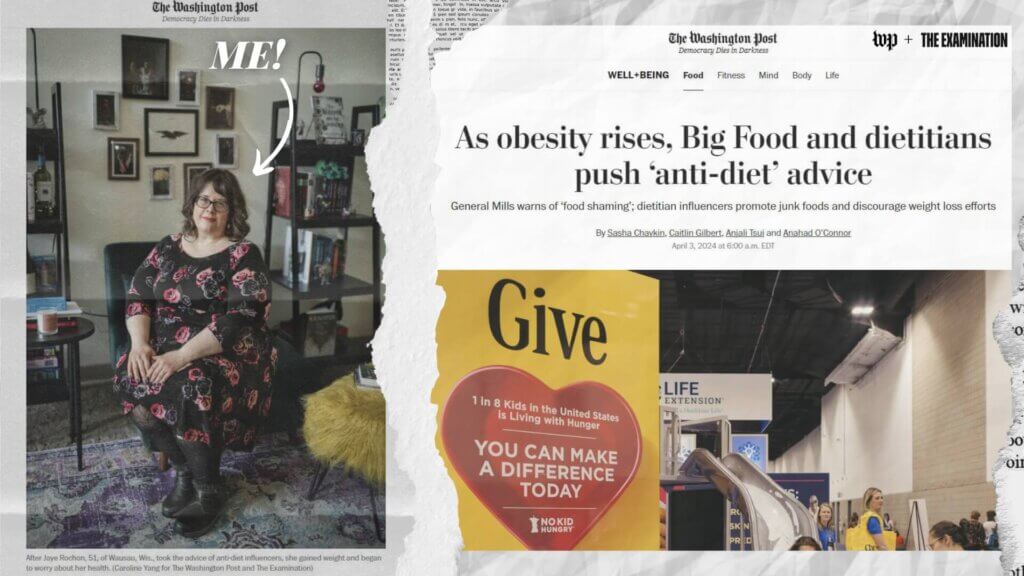
Washington Post / Examination Article Scrapbook Collage Created by Jaye
And there’s even more to my health story…
Disclaimer: I discuss food, weight, intentional weight loss, and my experience with anti-diet culture in this post. I fully believe in body autonomy—your body, your choice. I am a morbidly obese woman on an intentional weight loss journey. I’m not here to talk about body aesthetics; I’m here to talk about a controversial health topic. I maintain that people are people and should not be judged for their size; we don’t know anyone until we know their minds, hearts, dreams, and souls. If you’re happy with your body and relationship with food, that’s amazing—you do you! This is simply my story.
If you’d told me even a year ago that I would be sharing my sordid story about binge eating, anti-diet influencers, and rapid weight gain in The Washington Post the week of my fifty-second birthday, I likely would have believed you. After all, I’ve wanted to share my experience far and wide for over five years, but I couldn’t find the words.
I finally found my voice thanks to journalist Sasha Chavkin’s invitation to interview me for this Washington Post/Examination collaboration. And now, I’ve got some words.
Health Ideology vs Science
Did weighing myself trigger me to return to a dark state in my mental health? No, but believing the rhetoric of fat acceptance and the pseudoscience of anti-diet culture sure did.
Once I’d face-planted firmly back into reality, I needed to work through a deconstruction process to figure out why I’d veered so far off the beaten path of what I know is a healthy weight for my 5’ 2” frame. Spoiler alert: it ain’t 300 pounds. But it isn’t necessarily what the BMI says, either. Don’t you love nuance?
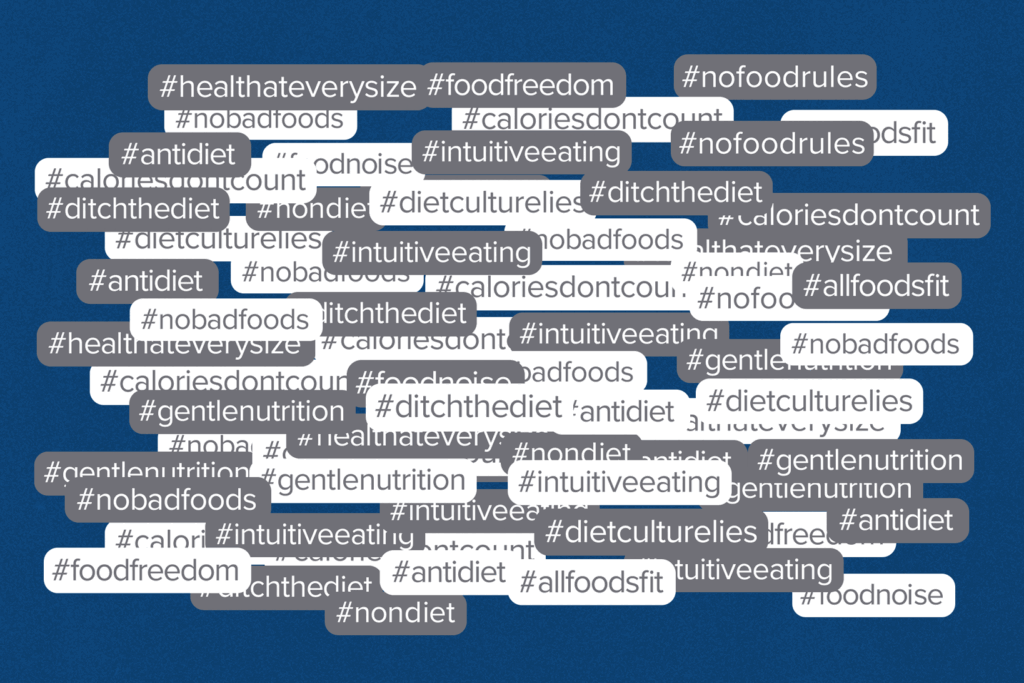
Source: Washington Post illustration/The Examination
It took years to understand that while Healthy at Every Size (HAES) is a lovely concept, it is still a philosophy—practically magical thinking. Philosophy is not science-backed medical advice. The idea has been around for less than twenty-five years; the small study groups and interventions employed to test the theory were mainly done with obese white women and not over a long period, certainly not with randomized control trials. According to this unbiased Pub Med article, HAES lacks much empirical evidence to be embraced as a widespread public health approach.
“It is also not yet clear if the HAES approach alone can reduce weight stigma and bias at a population level, without broader efforts to change societal norms and attitudes. Although conceptual debate is critical, it alone may not be sufficient to inform policy and practice without further empirical evidence to address current limitations. Rather than a debate that is polarized, we need to seek a common ground, working together to improve health and well-being for everyone. This requires stronger empirical evidence (i.e., larger, more representative populations), not only ideological discourse, on which to frame the debate.”
—The National Library of Medicine
While advocates of the anti-diet and HAES movements are enthusiastic about their approaches, it’s important to remember that these concepts are still in the developmental stages and need to be fully supported by extensive scientific research. A cautious approach might be more beneficial for public health, especially for those struggling with obesity and its comorbidities.

Deconstructing My Relationship with Food | Created by Jaye in Midjourney AI
Deconstructing Food Like Religion
I knew how to spot a spiritual charlatan, a fake guru, a self-help grifter a mile away, but health and wellness “experts?” This was new territory. I was desperate to heal my body and my relationship with food. And that’s when they get you: when you’re desperate to do the right thing for your health.
Sure, most of these anti-diet influencers and professionals think they’re helping people, and most may also have good intentions. But while the anti-diet movement is helpful to those who’ve suffered from anorexia, bulimia, overexercise, and ultra-restrictive relationships with food, it is proving to be harmful to those of us on the opposite end of that spectrum.
When you prioritize ideology over science and surround yourself only with like-minded individuals, it’s essential to reassess your beliefs periodically. This introspection is vital to ensure these ideologies do not lead to potentially harmful behaviors… like winding up in a cult that encourages overeating.
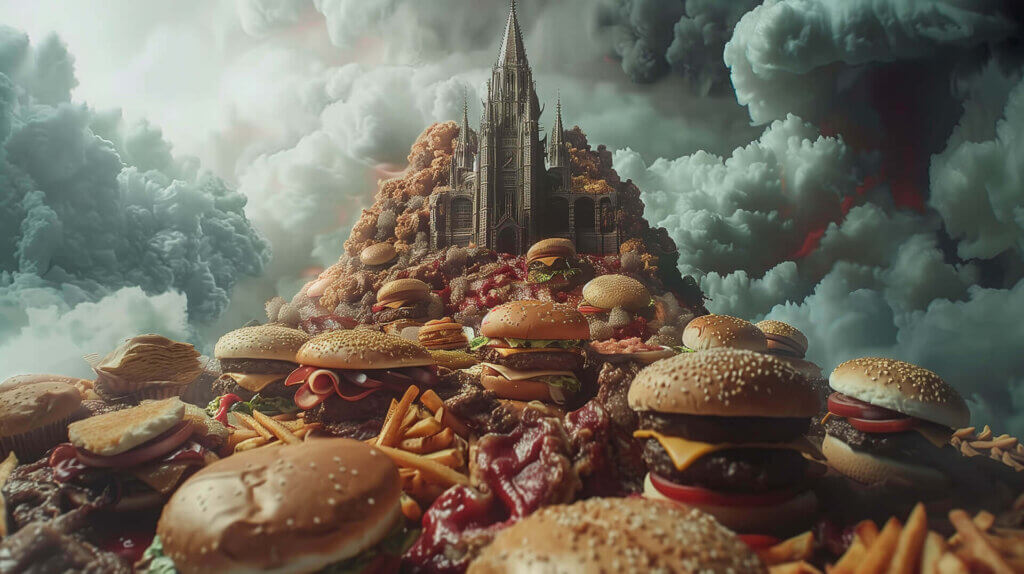
Church of the Latter Day Mukbangers | Created by Jaye in Midjourney AI
But Have You Ever Been Obese, Sis?
Their advice is best served to those who’ve been underweight. Yet they’re giving the same advice to obese people, with promises that we’ll heal our metabolisms and our hormones if we gain back the weight. They say our bodies will recalibrate to a natural, healthy setpoint once we’ve gained “some” weight. Then, the weight will come back off “naturally,” as if this stuff is magic and calories in/out are the philosophy, not the science.
When recovering fitness influencer Stephanie Buttermore decided to document her “all-in” journey to gain weight after being incredibly thin and much too lean, she wound up being about a size 8-10 after the regain. In other words, her heaviest “natural” weight is… average. She easily ate 10K calories daily to wind up the average. This is a unicorn situation here. Yet people are inspired by it and think it can happen for them.
At a size 22-24, I’m no Stephanie Buttermore—I haven’t been a size 8-10 in thirty years. If she’d had my genetics, this all-in method would have caused Stephanie to go from dangerously thin to morbidly obese. Had she lived even one day in a body over twice the size of her natural, healthy weight, I have a feeling she wouldn’t have been “all in” anymore.
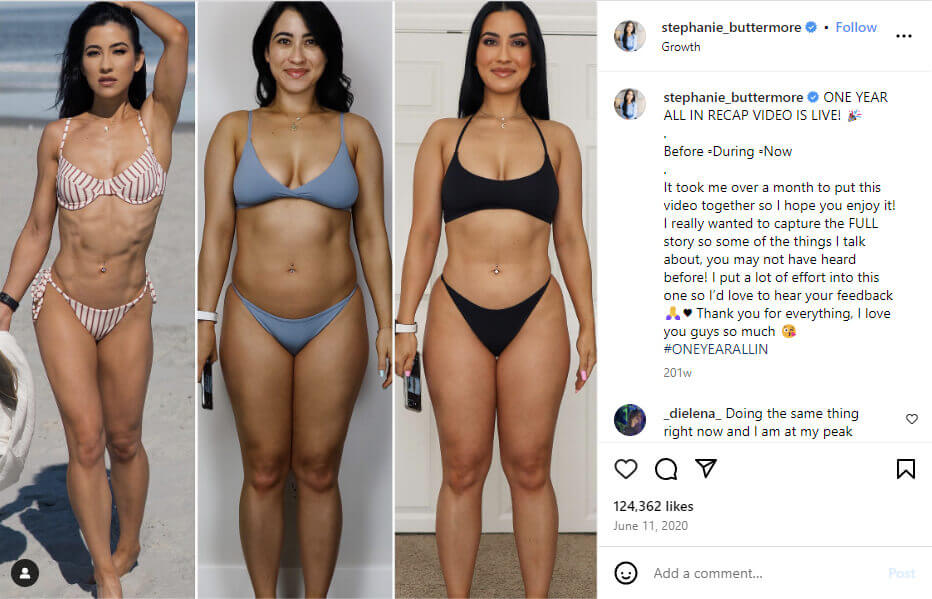
Stephanie Buttermore: naturally a “normie” after her regain
The concept of “eat whatever you want and you’ll be okay” is lovely—all too alluring for a food addict. It may be overly optimistic to suggest that individuals with a genetic predisposition to obesity can fully heal their bodies and relationships with food using this method alone. A more personalized approach, considering individual genetic factors, may be required. That’s why the internet can be such a tangled web: a one-size-fits-all approach does not work.
On the opposite side of the spectrum, Tess Holliday, a vocal fat activist, plus-sized cover model, and creator of the hashtag #effyourbeautystandards, honestly thinks she’s anorexic. People make fun of this, but I understand why she’s in this mindset—I was there too. It wouldn’t surprise me at all if, like me, the dots connected her to some anti-diet influencer or dietician who’s convinced her of this. One who likely has never been obese in their lives. (Just a theory, not a fact)!
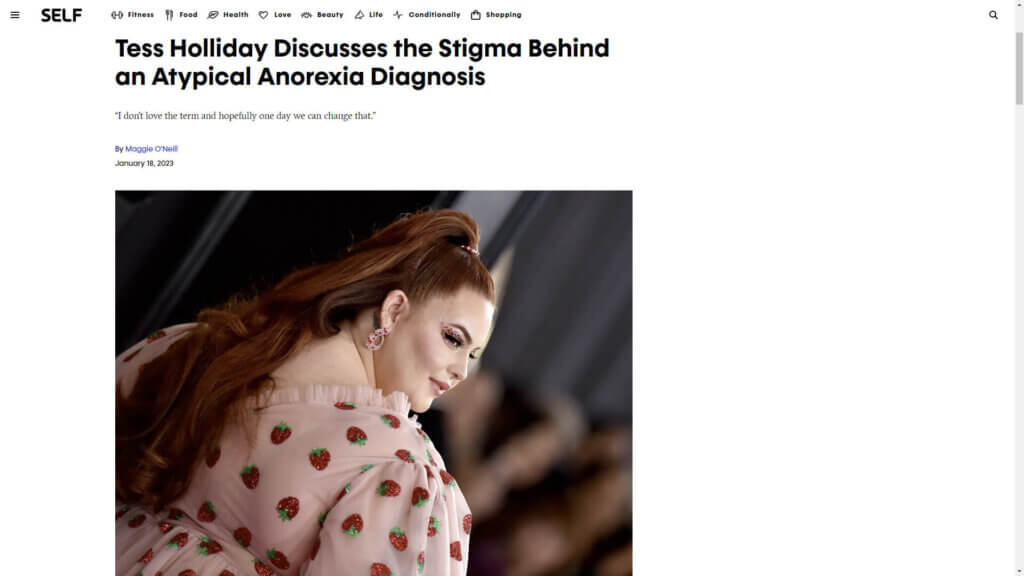
Food for thought: did an anti-diet coach/dietician convince Tess she’s anorexic? 🤔
Most Anti-Diet Influencers Don’t Understand Obesity
They don’t understand the hell of carrying over one hundred extra pounds on a skeleton that wasn’t built to withstand that kind of daily strain. If they did understand—because they’ve lived it—they would not be encouraging us to “embrace our fear foods.” They would know that for some of us, certain foods actually should be a little bit demonized… or at least kept out of the house and reserved for a picnic, a birthday party, or a very special occasion.
TL;DR: Some of us don’t need to eat “anything we want,” just as some people cannot be trusted to drink Vodka “in moderation.” If anti-diet advocates truly understood this because they lived it, they would not be telling obese people everything we want to hear: “Eat the damn donuts; it’s fine. You’ll be fine. Slay that family-sized bag of fear food chips, queen. Your body knows best.”
This isn’t a war fought within the body. Addiction is a war inside the mind. There is growing evidence to support that ultra-processed industrially-created foods are indeed highly addicting. Our brains crave that stuff, not our bodies.
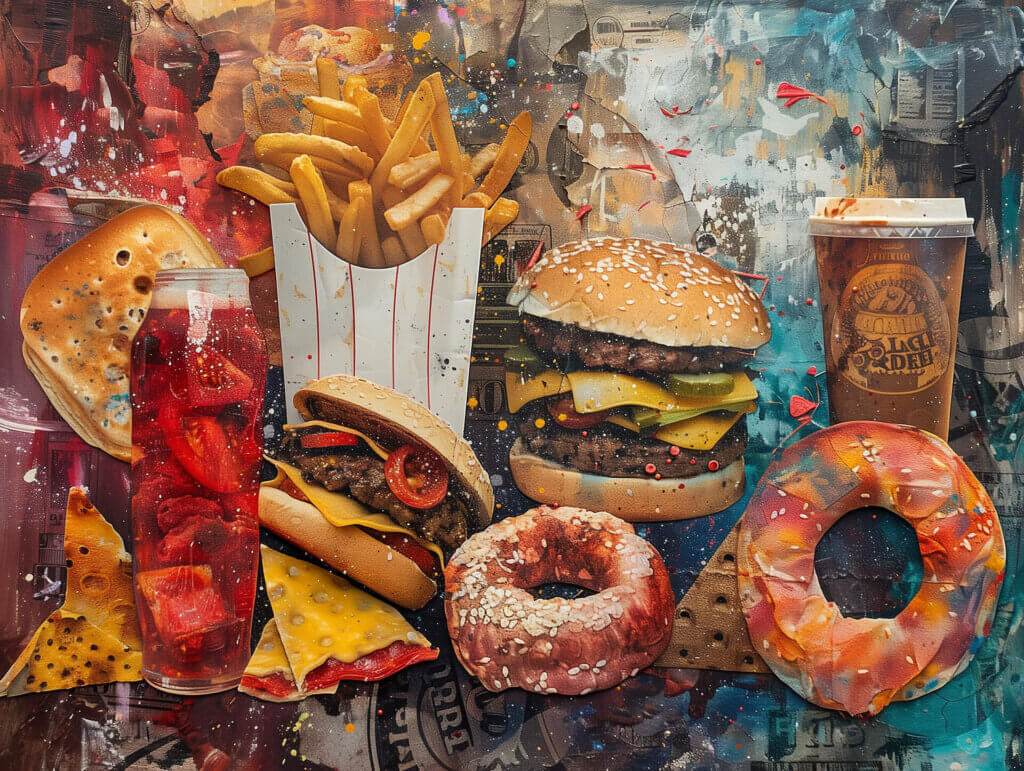
Junk Food Dystopia | Created by Jaye in Midjourney AI
Maybe Some Foods… Are “Bad?”
Weird Food Fact:
Did you know Kraft Singles need to be called Singles because they aren’t cheese? They’re a cheese product.
Yeah, that’s the world we’re living in.
But “Oh, the obesity epidemic!” they say, clutching their pearls while creating even more products that mess with our brain chemistry, giving big pharma more reason to recommend a lifetime prescription to Ozempic (another rant for another day).
The WaPo article also laid bare that these people are just giving straight-up terrible advice. I was the literal poster child of that bad advice. And now we’re onto them: #antidiet culture has been hijacked. It’s now become part of the obesity problem, not the solution.
And wow, those influencers had some words for me. One on TikTok concluded that I ate Nutella and cupcakes “at every meal.” Newsflash: no, not every meal. But regularly enough to add on the calories required to make me rapidly gain back fifty pounds.
Calories in, calories out is not a myth. Neither is the fact that ultra-processed foods, even in small quantities, can trigger binge eating cycles for some people.
But like I said, they don’t understand us. Most of them have never been obese a day in their lives. They may know how to put the chips down. Some of us don’t.
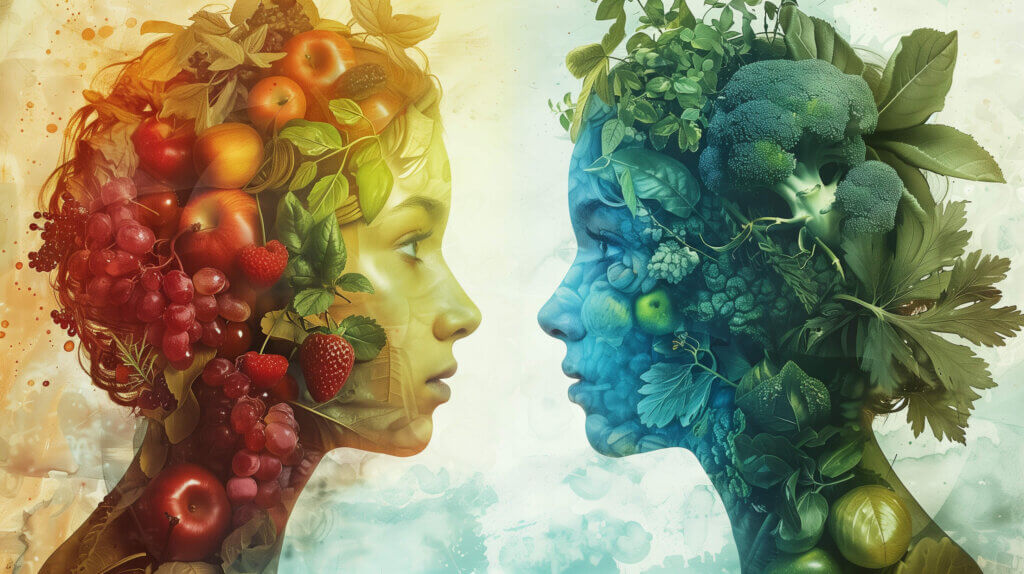
Food Sanity | Created by Jaye in Midjourney
Finding Food Sanity
We live in an obesogenic society where profits are more important than people—my war is with what this has done to my body, not with my body herself. My body is a miracle; I love her with my entire soul.
The food industry can’t get enough of our money, plain and simple. They engineer foods to be “bliss point” palatable. The nastiest food is the most addictive—just as they’ve designed it. They also pour tons of money into advertising, including buying off influencers, and they’ve got the jingles to match their intentions: “Once you pop, you can’t stop.” “Bet you can’t eat just one.”
The obesity epidemic in America cannot be reduced to issues of laziness, willpower, or gluttony. It’s essential to consider the economic forces at play. Following the money can provide insights into these systemic issues. Big food has corrupted our food supply. It’s cheaper and more accessible than ever to get our hands on highly addictive, inordinately caloric foods. They’re brainwashing us ever so deliciously. We are dying of Consumption 2.0.
Well, I want out.
It will take boundaries with myself and with others.
It will take questioning why I’m “craving” a food. It will take fearless, rigorous honesty. It will take seeking credible, scientific studies unrelated to industry and profit.
When I eat primarily whole, minimally processed foods, I feel the most sane. Maybe it’s just that simple?
It feels like an excellent start.
Question Those (Man-Made) Cravings
Sorry, not sorry, #antidiet culture. I’m not going to “eat whatever I want,” no matter how much you reassure me that it’s perfectly “healthy” to do so “in moderation.” Bliss point foods are created to obliterate moderation. Just because I can eat that food doesn’t mean I should.
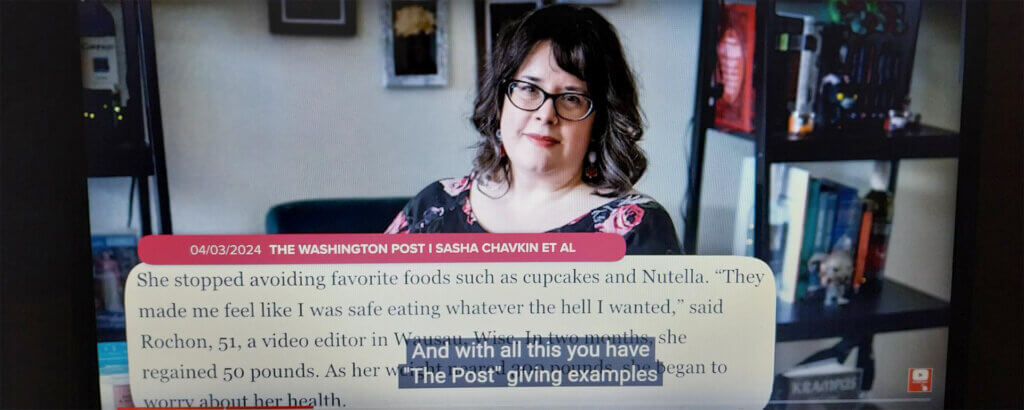
When a friend sees you on Philip DeFranco & sends you a snap of his TV!
If you’ve made it to the end of this article, thank you so much for reading! I’m documenting my recovery process at @JayeWeighsIn on YouTube and (occasionally) on other social media. Follow me if you’d like, or “weigh in” via the comments here! I’d love to keep this conversation going, no matter your beliefs or lifestyle.
💖
~Jaye
This article was first published on my Substack and Medium Blog.


0 Comments